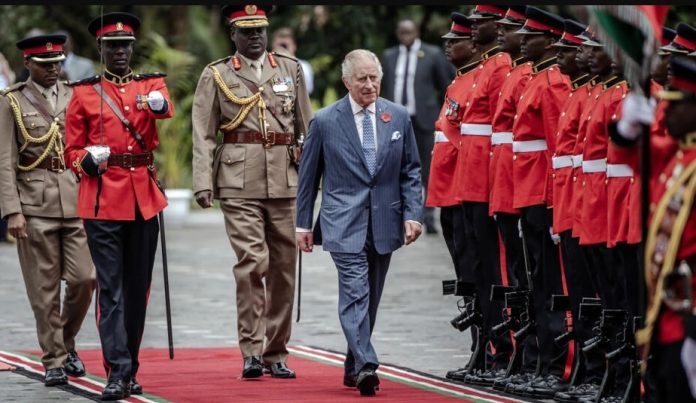On Wednesday, King Charles III will begin the second day of his visit to Kenya after he admitted that colonial-era abuses during British rule in the East African country “cannot be justified”.
Charles said that during his four-day visit to Kenya, along with Queen Camilla he wanted to “deepen his own understanding of these mistakes” as well as strengthen “a modern partnership of equals facing today’s challenges”.
On the eve of his arrival, Charles had been urged to formally apologise to the country that Britain brutally ruled for decades before Kenya’s hard-won independence in 1963. On his first day in Kenya, the 74-year-old British head of state said the “wrongdoings of the past are a cause for the greatest sorrow and deepest regret” but did not apologise. On Tuesday evening, he told a state banquet:
There were abhorrent and unjustifiable acts of violence committed against Kenyans as they waged… a painful struggle for independence and sovereignty. And for that, there can be no excuse. None of this can change the past but by addressing our history with honesty and openness, we can perhaps demonstrate the strength of our friendship today, and in so doing, we can I hope continue to build an ever-closer bond for the years ahead.
This is Charles’ first visit to Africa and the Commonwealth nation since ascending the throne. Charles has previously made three official visits to Kenya. In the coming days in Nairobi and Mombasa, Charles plans to visit a cemetery of war graves to honour Africans who died for Britain in the two world wars. The King will also plant trees in memory of the late Kenyan conservationist Wangari Maathai.
On Tuesday, Charles and Camilla were given a red carpet welcome by Kenyan President William Ruto before laying a wreath at the Tomb of the Unknown Warrior at Uhuru Gardens Memorial Park. It was at this spot that Kenya’s independence was declared at midnight on 12 December 1963. The Union flag was lowered and replaced by the black-red-green-white flag of Kenya. However, the gardens were built on the site of a camp where the British colonial authorities held suspected Mau-Mau guerrillas during the suppression of their 1952-1960 rebellion.
At least 10,000 people, mostly Kikuyu, were killed during the “Emergency” period. The period saw one of the bloodiest uprisings of the British Empire. Tens of thousands more were rounded up and detained without trial in camps where reports of executions, torture and vicious beatings were common during this period. Some human rights groups said Charles should issue an unequivocal public apology for the abuses.
Ruto said the state of emergency had “intensified the worst manifestations of colonial impunity” and called Britain’s response to Kenya’s quest for self-determination “monstrous in its brutality”. However, he welcomed Charles’ “courage and willingness to shine a light on uncomfortable truths”.
It was in Kenya that Queen Elizabeth II – then a princess – learnt of the death of her father, King George VI, in 1952, beginning her historic 70-year reign.
Charles said Kenya had “long held a special meaning for his family”, emphasising his mother’s “special affection” for the country and its people. The royal programme has a particular focus on combating climate change, as well as supporting youth, creative arts and technology.
The Commonwealth, which comprises 56 nations across five continents, was born out of the embers of the British Empire.
